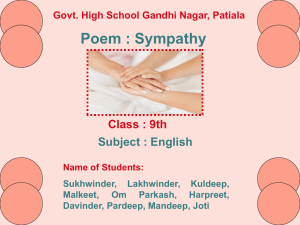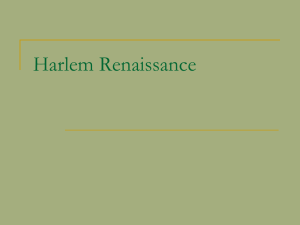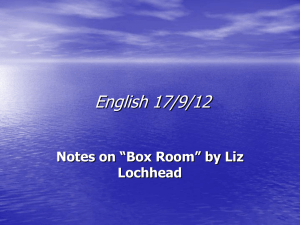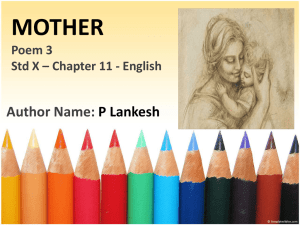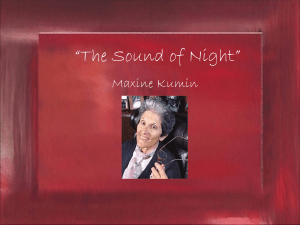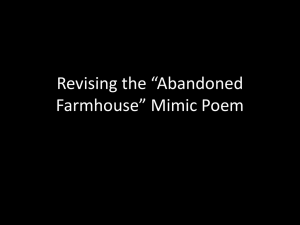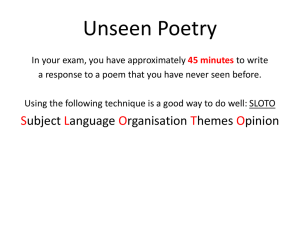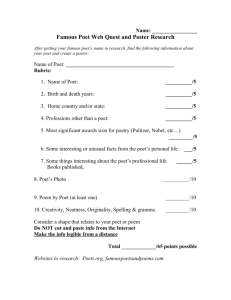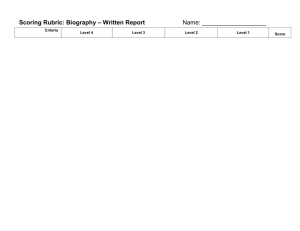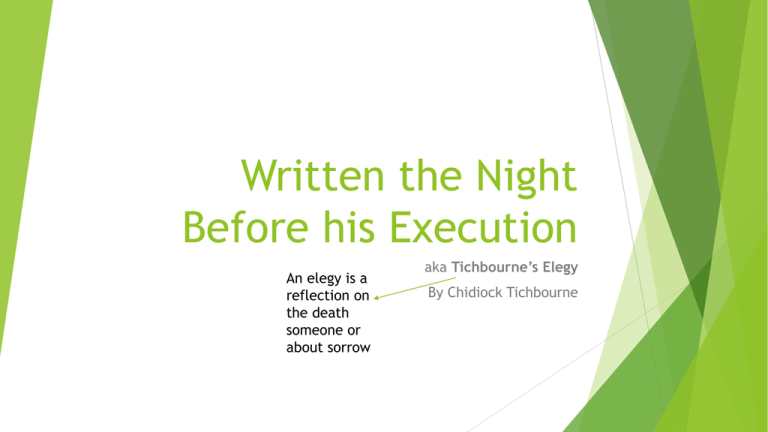
Written the Night
Before his Execution
An elegy is a
reflection on
the death
someone or
about sorrow
aka Tichbourne’s Elegy
By Chidiock Tichbourne
The poem…
My prime of youth is but a frost of cares,
My feast of joy is but a dish of pain;
My crop of corn is but a field of tares,
And all my good is but vain hope of gain;
My day is past, and yet I saw no sun;
And now I live, and now my life is done.
My tale was heard, and yet it was not told,
My fruit is fallen, and yet my leaves are green;
My youth is spent, and yet I am not old,
I saw the world an yet I was not seen.
My thread is cut and yet it is not spun;
And now I live, and now my life is done.
I sought my death, and found it in my womb,
I looked for life, and saw it was a shade,
I trod the earth and knew it was my tomb,
And now I die, and now I was but made:
The glass is full, and now my glass is run,
And now I live, and now my life is done.
Context
Written by Tichbourne - a national terrorist or Christian martyr because he
had committed treason by trying to assassinate Queen Elizabeth 1.
Under Elizabeth Catholicism was illegal and Catholics could no longer publicly
worship and had to be careful to hide their faith. Tichbourne was a minor
conspirator in a plot to overthrow the queen and replace her with the next in
line, Mary, Queen of Scots, who was a Catholic (the Babington Plot). Life for
Catholics was difficult as they had no religious freedom and were kept from
positions of privilege or royal favour.
The plot did not succeed because of a fellow conspirator turned the rest in to
escape punishment himself. All those caught were sentenced to death.
Apparently the poem was written on 19th September, the eve of his execution.
The next day he was hung but wile he was choking he was disemboweled alive
(hung, drawn and quartered).
He was between 23-28 at the time of his death.
The poet uses a similar use of antitheses and metaphors to convey his frustration of
Last meals
his life being cut short
Use of words or phrases to contrast with each
were not of
other in order to create a balanced effect
nourishment
Written in first
He is at the
but was that
person, ‘I’ and
MAYBE alludes to the
Sadness/Troubles
pinnacle of his
of emotional
‘my’ show how
Gospel imagery of the
life
suffering
he was in a state
painful cup that must be
My prime of youth is but a frost of cares,
of complete selfdrunk to fulfill God’s will
My feast of joy is but a dish of pain;
absorption and
(Jesus) – Last Supper
My crop of corn is but a field of tares,
mental isolation
Never had a chance
Weeds
And all my good is but vain hope of gain;
in his last hours –
to enjoy life like
The day is past, and yet I saw no sun;
understandable
Agricultural Metaphor other youths
And now I live, and now my life is done.
really!
Nothing truly worthwhile was
His life has come to its end
produced by him in his life
The only way the poet has
In this case the
benefited in his life is by hoping
Last line is repeated in all three
contemporary
to make an achievement but has
stanzas so as to emphasise
English
in reality his efforts were al in
although he is alive at this
translation of
‘vain’
precise moment in time his life is
‘but’ is ‘just’
virtually over
Although the poet is young his life is ‘frost’, joyless and full of worries = impending death
Feeling of defeat is heightened when he reminisces and realizes that he actually hasn’t really
accomplished anything worthwhile in his short life. Each line contrasts his youthful life, his prime,
with the certainty of his death.
The poet had
a life, his
existence is
recorded
Expressing
frustration that his
life was not lived
to the full..does
not have a legacy
to leave behind
He uses paradox to
contrast between
his expectations as
a young man and his
reward as a traitor
Compares life
to a tree, he is
a fruit hat has
ripened and
fallen to the
ground
because his life
My tale was heard, and yet it was not told,
is about to
My fruit is fallen, and yet my leaves are green; Did not have time to
end. Slight
My youth is spent, and yet I am not old,
leave a mark
connotation
I saw the world, and yet I was not seen.
that he is
My thread is cut, and yet it is not spun;
His life has not
ready for his
And now I live, and now my life is done.
been lived out
death even
In Greek mythology the
though he is
Could emphasize the poet’s inability to
fates would spin thread to
still young
escape his execution
decide how long a person
would live
Tichbourne has established in the previous stanza that he had not achieved
anything substantial now he is actually realizing that he will never get the
chance to make something of himself
He
never
fully
trusted
life, as
he saw
it as a
‘shade’illusory
He expected his death, it
was decided even before
he was born
Reference to the
origin of his fate, it
all started when he
was born Catholic.
His fate to fight for
his beliefs.
Everyone is born
to die
Reference to the way he
dies-stomach is slashed
open(foreshadow)
Common poetical
I sought my death, and found it in my womb,
conceit…puns on a man
I looked for life, and saw it was a shade,
being biblically created on
I trod the earth and knew it was my tomb,
earth and returning to
And now I die, and now I was but made:
earth
The glass is full, and now my glass is run,
From the point of
Image of an
And now I live, and now my life is done.
view of eternity, He
hourglass
feels like his life
just started a
Perhaps it can also be that for the first time he is really
moment ago and is
living because heaven is now on the horizon and he is
now already coming
realizing what life s about
to an end but it is
okay because his
In this stanza the poet takes his inevitable outcome as an expected outcome
transition to heaven
with no other possible alternative options, as though death is the proper thing
for him to experience at this moment. Though poet is troubled by how it ends, is instantaneous
you can perceive that he did fulfill his earthly purpose and can now die in
peace
General Remarks
Although the poem picks up on many images of regret and despair it is in itself
not a despairing poem, instead I feel it is one of acceptance and stubbornness to
continue on defiantly down this course till the end
With the exception of fallen every word in the poem is of one syllable, this adds
to the stark and plain tone of the poem…it doesn’t try too hard he has stripped
himself bare
The fact that the poet is writing poetry in his last moments gives him an element
of grace and dignity…which is seen in the poem through the use of proper
punctuation, caesura and perfect iambic pentameter with a true ABABCC rhyme
scheme
Each end rhyme pair is significantly appropriate, each being an opposite of the
other and yet equated.
e.g
My prime of youth is but a frost of cares,
My crop of corn is but a field of tares,




